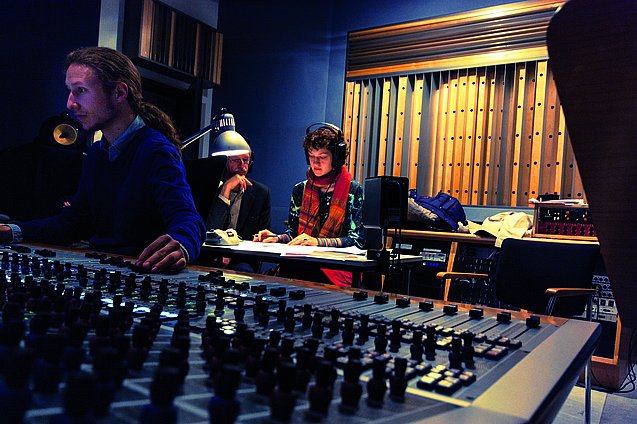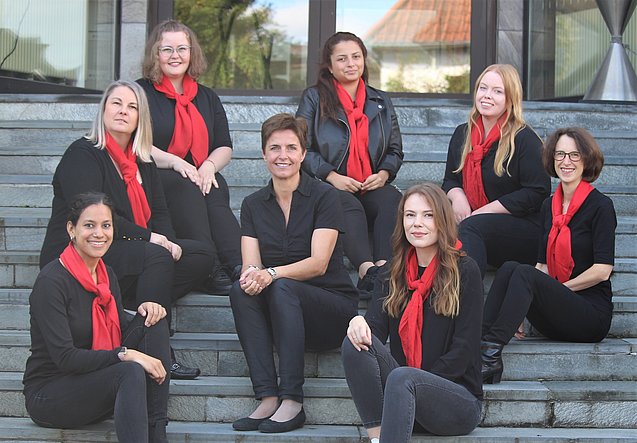Music Recording/Tonmeister, Music & Sound Directing

Unfortunately, the overview is only available in German so far. Please consider the panel "Auf einen Blick" here.
The journey from the live musical experience to audio production, whether it be a CD, live streaming or audio file, often seems trivial and obvious. But the process conceals a great many complex procedures, all of which presuppose artistic understanding. Detmold University of Music with its Erich Thienhaus Institute (ETI) is a leading international player in this field. The study programmes Music Recording/Tonmeister and Music Directing/Tonmeister train the students to be music and sound directors. In this role they will be responsible for directing an artistic recording and ensuring the quality of the production. Depending on the type of recording, a variety of production technologies may be required. The study courses teach artistic and musical skills, as well as the ability to communicate. Stress is also laid on technical foundations and extensive practical experience of producing a recording in the studio. The Erich Thienhaus Institute has professionally equipped studios with all the necessary equipment in unique premises. The students work together closely with the artistic study courses; from the outset they have the chance to be in charge of artistic recording processes. Graduates of the ETI have founded their own labels, or are working in a freelance capacity on recording and production-related projects in theatres, broadcasting companies and opera houses.
Work placements and external collaborations during their period of study ensure that students familiarise themselves as early as possible with the way the market works. For example, both the Baltic Sea Youth Philharmonic Orchestra and the Sibelius Academy in Helsinki have profited from our students’ comprehensive expertise. At the end of each work period, the Erich Thienhaus Institute students produce a CD for the German Federal Jazz Orchestra (BuJazzO) of the works performed, make a recording of the final concert and create a broadcast tape for Westdeutscher Rundfunk.
Unfortunately, official documents are only available in German so far. Please consider the pannel "Studiengangsdokumente" here.
Winter semester
Bachelor/ Master: 15.02. - 15.03.
Summer semester
Bachelor/Master: 01.10. - 01.11.
Please apply to the Detmold University of Music via the online platform muvac.
- First of all, create your muvac candidate profile with as detailed information as possible.
- Then select the degree program you are interested in amongst the vacancies directly in muvac under Institutions – Hochschule für Musik Detmold. It is important that you upload your complete application documents and your video for the pre-selection (if required for your degree program). Check beforehand that your video meets all the requirements.
- A processing fee of 50.00 Euros will be charged for the application. Please note: a refund is not possible.
Important: Please check in your e-mails afterwards that you have received a confirmation e-mail. You will be informed about the status of your application via muvac.
The probable dates of the aptitude tests can be found here.
The following requirements must be met for the chosen study programme:
- evidence of the higher education entrance qualification
- successful completion of the aptitude test
- evidence of knowledge of German
- evidence of health insurance
- evidence of payment of the semester fee
no preliminary round
The aptitude test consists of four written exams, if applicable a colloquium and the instrumental respectively vocal exams.
The aptitude test applies as not passed, if the result of only one of the parts was not sufficient. In this case you can repeat the aptitude test a second time. Already passed exams are going to be recognised.
The aptitude test consists of the followings parts:
| Main subject Music recording | Written examination of 90 minutes duration. The musical and technical ability to differentiate will be determined using sound examples of serious as well as popular music. Questions on musical terms, common instruments and instrumentation of sound bodies (classical / pop) as well as basic knowledge of musical acoustics complete the first part. In addition, there are questions on technical and mathematical basics of recording studio technology, acoustics and computer science. |
| Literature and knowledge of works | Written examination of 60 minutes. Typical stylistic classifications of score pictures are to be made and sufficient prior knowledge of composers, instruments and musical literature from the Renaissance to the present is to be demonstrated. |
| Aural Skills | Written examination of 60 minutes duration. Here the applicant has to demonstrate the ability to recognise elementary rhythmic, melodic, harmonic and formal connections by listening. The tasks focus on the recognition of time signatures, rhythms, intervals and chords, memory tasks in the melodic area, notation of a two-part movement according to dictation, recognition of errors in a three-part movement and in free-tonal sounds. Example |
| Music Theory | Written exam of 60 minutes duration. Advanced knowledge of major-minor harmony is expected: Elaboration of a figured bass, a two-part polyphonic and a four-part homophonic song or chorale movement. Example (The Deutsche Tonkünstlerverband offers preparatory courses in music theory and ear training for the aptitude test in Detmold) |
| Colloquium | In the case of ambiguous examination results, the audition panel reserves the right to hold an additional colloquium. In this interview the examination board asks in-depth questions about the written examinations. As a result, the aptitude can be determined. Everyone who has passed the audition parts (1) - (4) then takes part in the auditions for the artistic main subject and secondary subject (2nd instrument) |
| Main instrumental/ vocal subject | The duration of the audition performance in the artistic main subject is up to 20 minutes. The applicant submits to the panel a list of works prepared for the performance, containing demanding literature from different stylistic periods important for the respective instrument or voice, including contemporary music, possibly also etudes. The works should be prepared in their entirety. The panel selects the works or parts of works to be performed by the candidate from the list. The assessment criteria are musical interpretation, artistic imagination, fidelity to the work, stylistic sensitivity, technical ability and the choice of level of difficulty. The panel may interrupt the performance. In the evaluation, the panel shall take appropriate account of the course of study the applicant is pursuing. |
| Secondary instrument | Compulsory subject piano: For all main subject instruments apart from keyboard instruments (piano, organ), accordion, harp and guitar: Performance of two piano pieces of intermediate difficulty from different musical periods. If piano is the main subject instrument, then there is free choice of a second instrument. However, it can only be taken during the degree course if prior knowledge can be demonstrated during the audition and the study place capacity of the Detmold University of Music also allows it. As a rule, the instrument must be chosen before the start of the degree course; only in exceptional cases and on application can the study of a second instrument be taken up within the first year of study. Two easier pieces from different musical periods are to be performed. Level of difficulty at least “lower grade” (Unterstufe according to the definition in the teaching plan of the Verband deutscher Musikschulen). |
The following requirements must be met for the chosen study programme:
- Bachelor's degree in Music Recording respectively diploma in Tonmeister
- successful completion of the aptitude test
- evidence of knowledge of German
- evidence of health insurance
- evidence of payment of the semester fee
For the registration to the aptitude test the following is required: - CV in table form
- written explanation of the choice of the study programme as well as the study focus
- a CD/DVD with three productions of the last year
The aptitude test consists of a practical test and an interview, the purpose of which is to determine whether the applicant has the aptitude and motivation to achieve the course objectives independently and responsibly, and possesses the necessary qualifications. The individual test elements are:
- Presentation of a CD/DVD with three of the applicant's own productions from the last year.
- Colloquium: questions about knowledge of musical repertoire, basic musical and technical principles and studio experience in the chosen area of focus.
The aptitude test will be carried out by at least two members of the Aptitude Committee and will last approx. 30 minutes. The Aptitude Committee will issue an assessment of either „qualified“ or „not qualified“.

If you have any further questions, please don't hesitate to contact us. Please visit us at our opening hours or write a mail to the following address:























